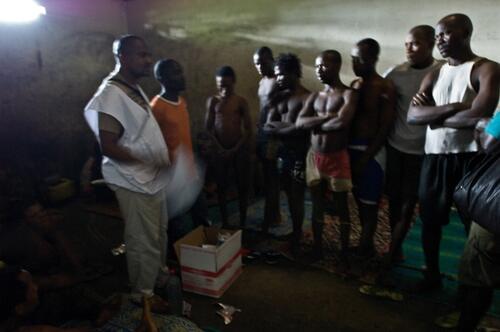In the civilian prison of Guéckédou, in the south-eastern region of the Republic of Guinea, Médecins Sans Frontières teams have been working in an alarming medical and nutritional situation. For over two months, they have striven to improve the prisoners' health conditions, containing what was a descent into acute malnutrition for some, and for others, certain death.
Adolphe Masudi Okamba, the MSF nurse, picks up the boxes of therapeutic food to treat malnutrition and jumps into the vehicle taking him to Guéckédou's civilian prison. The town is buzzing. It is the end of Ramadan. Everyone is decked out in his or her best clothes, and the savoury smells of local dishes mix in with the shimmering colours of passers-by and the landscape.
This town of 175,000 inhabitants has not always been bursting with life. The war, the spill-over of conflicts from neighbouring Liberia and Sierra Leone, the influx of thousands of refugees and the exodus of the local population have deeply scarred its history. MSF has responded to the multiple crises and emergencies that have battered the region since the early 1990s and is currently working in a treatment centre for HIV/AIDS patients, based in the prefecture's hospital.
The civilian prison of Guéckédou is located near the hospital; a large secluded rectangular building, with only a few windows. In early September of this year, the MSF teams carried out an evaluation of the nutritional and medical situation here. Their findings were alarming: prisoners concentrated in a limited number of cramped, inadequately aired and poorly lit cells, minors mixed in with adults, a lack of privacy and hygiene leading to a proliferation of skin and respiratory diseases. Three prisoners with tuberculosis were left together with the other prisoners but failed to receive treatment, exposing dozens of fellow inmates to infection.
At the outset of the MSF intervention, hygiene standards fell considerably short of prison regulations, but the nutritional situation was more worrying still: more than one prisoner in three suffered from malnutrition.
"The prisoners don't receive enough food – in terms of quantity or nutritional quality," explained Adolphe. "They only have one meal a day: a meagre bowl of rice, livened up with a basic sauce for the luckier ones. There's not enough water available either. Half the prisoners are dehydrated."
Only the men are affected by malnutrition and dehydration. The women, numbering 13 of the prison's 72 inmates, receive milder treatment. They are allowed to use the courtyard during the day, and so can access toilets and the water pump, and get the soap and food their families bring for them.
All prisoners are supposed to enjoy these rights, but the men have been deprived of them for several weeks now.
"These men are paying for the escape of several prisoners last summer," explained Adolphe. "Since then, they haven't been allowed to use the courtyard, and when we arrived, they hadn't even been allowed to take a shower for weeks."
For a dozen of them, the punishment goes further still. Their ankles are chained to a metal bar, pinning them to the spot. They're rotting in the "dark room", the collective isolation cell.
"Too much suffering here"
The scene that meets the eye upon entering the "dark room" is beyond belief. Some 26 prisoners, crammed into a space of about three by four meters, can only be made out by squinting. A narrow horizontal window provides the sole source of light in the room. The prisoners at the back have to wave their hands to signal their existence. Most of them are sitting down, their knees folded under their t-shirts and their faces haggard. Two jerrycans, sawed off at mid-height, serve as toilets.
Even the more favorable conditions reserved for women are put in perspective when we dig a little deeper. Myriam (all names have been changed) gave birth in mid-August, assisted by her fellow prisoners, and Rosa, approaching her due date, has received no ante-natal care at all. Some women hinted that they pay off the guards so as not to stay locked up in cells all day.
"It's survival of the fittest in Guéckédou, as in many other prisons," said Frank Bossant, the MSF Coordinator in Guinea. "Those who have money or family in the area fare better. The others are condemned to the most basic living conditions, just waiting, some of them condemned to a slow death."
Poor detention conditions is not confined to Guéckédou's prison. Among the problems impacting on prisoners' health in the country, malnutrition is a widespread issue, but that has been aggravated by the current food crisis and inflation.
"For MSF, this intervention is an emergency response, and we are currently extending it to a few other prisons," said Adolphe. "But we do not intend to take over the state's responsibilities. It is not our role. The authorities need to react, without delay."
At the end of Adolphe's distribution of therapeutic food, as the last cell door closes, a voice lets out a cry: "Help us. Let people know what's happening here. There's too much suffering. Too much suffering here!"



